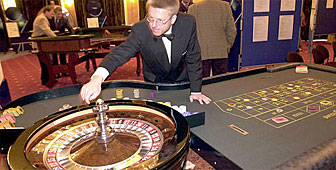New casinos spark concerns about gambling addiction

Government plans to award up to six new licences for so-called "grand casinos" has re-ignited the debate about gambling addiction. Parliament has placed the responsibility for tackling addiction squarely on the casinos themselves.
Traditional casinos with blackjack tables and roulette wheels are illegal in Switzerland. Instead the country has 23 “kursaals”, where gamblers can play slot machines with a maximum bet of SFr5 ($2.78).
But the government is soon to issue between four and six licences for what are described as “grand casinos”, with the full range of gaming tables, where punters can bet up to SFr500 at a time.
Parliamentarian Bosshard Walter, told swissinfo that “Parliament expects the casino business to operate their own gambling addiction prevention schemes”.
The Swiss Casinos Social Advisory Board, a body funded by the casino operators to tackle gambling addiction, estimates that between 10,000 and 20,000 people in Switzerland are gambling addicts.
A study carried out by “Careplay” at the Lucerne Technical School found that the overwhelming majority of gambling addicts are men, and that some 40 per cent are Swiss, while the rest are immigrants.
The Swiss Casinos Social Advisory Board regularly collaborates with psychiatrists and psychologists who treat people with gambling problems to fully understand the phenomenon.
Equipped with this specialist knowledge it has made a number of proposals about how to prevent people from becoming addicted to gambling.
“We have to take a whole range of measures,” said Christian Bretscher, chairman of the Swiss Casinos Social Advisory Board. “It starts with information. It’s very important that people know they aren’t alone with their problem. Employees in casinos must also be taught to recognise people who have a problem.”
A study into the treatment of gambling addicts by therapists in canton Ticino showed that people needed professional help. But it also found that keeping addicts away from slot machines greatly increased their chances of kicking the habit.
Bretscher is confident that the “grand casinos” won’t lead to an increase in the number of gambling addicts because, he says, they are attracted by slot machines, rather than gaming tables, where punters play blackjack and roulette.
“It is the speed with which someone pumps money into a one-armed bandit and the thrill of hitting the jackpot, which is at the heart of gambling addiction.”
With at least one of the “grand casinos” set open its doors by the end of the year, that theory will soon be put to the test.
by Sally Mules

In compliance with the JTI standards
More: SWI swissinfo.ch certified by the Journalism Trust Initiative
You can find an overview of ongoing debates with our journalists here. Please join us!
If you want to start a conversation about a topic raised in this article or want to report factual errors, email us at english@swissinfo.ch.